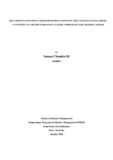| dc.contributor.advisor | Kabir, Dr. Md. Humayun | |
| dc.contributor.author | Sil, Suman Chandra | |
| dc.date.accessioned | 2024-03-14T06:23:16Z | |
| dc.date.available | 2024-03-14T06:23:16Z | |
| dc.date.copyright | 2022 | |
| dc.date.issued | 2022-10 | |
| dc.identifier.other | ID: 14168011 | |
| dc.identifier.uri | http://hdl.handle.net/10361/22497 | |
| dc.description | This thesis is submitted in partial fulfillment of the requirements for the degree of Master in Disaster Management, 2022. | en_US |
| dc.description | Cataloged from PDF version of Thesis. | |
| dc.description | Includes bibliographical references (pages 67-86). | |
| dc.description.abstract | Despite having an average annual rainfall of 2400mm- 2600mm rainwater harvesting is still
considered as “Seasonal solution” for drinking water sources in the coastal area of Bangladesh.
Given the phenomenon of “Too much or too little rainfall” during different seasons that result
in a huge waste of rainwater makes it difficult to design a rainwater harvesting system that can
provide adequate and year-round drinking water yet economically feasible for the low-income
households. However, the needs for drinking water, especially in the multi-hazards coastal area
of Bangladesh is a “must-have” survival issue that goes beyond any technical or economic
feasibility framework. This leads to a quest of designing a rainwater system, specifically the
storage tank which is more “reliable” as well as “affordable” for the low-income households
including the 35 million people living in the coastal area of Bangladesh.
Employing a mixed method approach in combination of literature review, Simple Random
Survey (SRS), Focus Group Discussion (FGD), in-depth interviews and hypothetical scenario
analysis, this paper introduces the “Cluster Approach Tank Sharing model” and presents the
result which shows improved “Reliability” of the rainwater harvesting system. The concept
“Tank Sharing” used in this study has already been proven successful in the “Off-grid” smart
energy sharing (solar) and decentralized water supply as well as sewage system design.
The result of this study can potentially be used by different stakeholders including the
government, NGOs, and the private sector to scale up the rainwater harvesting systems,
especially in the water-stressed settings such as the coastal area of Bangladesh. This scale-up
of the rainwater harvesting system will contribute to achieving SDG 6 targets by providing
more “reliable” and “affordable” drinking water for all and thus contributing to the economic
progress while keeping the environment safe. | en_US |
| dc.description.statementofresponsibility | Suman Chandra Sil | |
| dc.format.extent | 90 pages | |
| dc.language.iso | en | en_US |
| dc.publisher | Brac University | en_US |
| dc.rights | Brac University theses are protected by copyright. They may be viewed from this source for any purpose, but reproduction or distribution in any format is prohibited without written permission. | |
| dc.subject | Rainwater harvesting | en_US |
| dc.subject | Coastal | en_US |
| dc.subject | Bangladesh | en_US |
| dc.subject | Tank sharing | en_US |
| dc.subject | Off-grid | en_US |
| dc.subject | Reliability | en_US |
| dc.subject.lcsh | Hydrology. | |
| dc.subject.lcsh | Water harvesting. | |
| dc.subject.lcsh | Water reuse. | |
| dc.title | Reliability of rainwater harvesting system in the coastal Bangladesh: A conceptual framework for cluster approach tank sharing model | en_US |
| dc.type | Thesis | en_US |
| dc.contributor.department | Department of Architecture, Brac University | |
| dc.description.degree | M. Disaster Management | |

